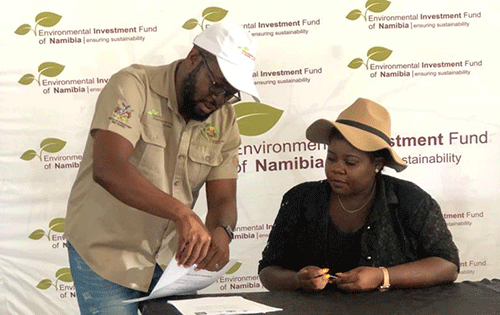RUNDU – The Environmental Investment Fund (EIF) of Namibia last week launched the Urban Agriculture Grant E-voucher card and terminal rollout in Rundu.
Several youths were granted the vouchers as financial support to participate in the Build Back Better programme. The programme aims to improve the production of nutritious, high-value produce such as vegetables and fruits to address nutritional deficiencies affecting urban and peri-urban households.
The rollout will cover about 17 beneficiaries who were identified to benefit from the project titled, ‘Strengthening Namibia Food Systems to Recover from Emergencies and Disease-Related shocks through the Build Back Better (BBB) Programme’.
“We are grateful for the E-vouchers. This will assist us to achieve the project’s objective. We use to see these kinds of benefits from far but now we are also getting a chance to improve our situation as the youth of Rundu Urban constituency or Kavango East,” said Bibiana Sirenga Shapi, who signed on behalf of the 17 youths at Rundu.
“This pilot programme entails, as first beneficiaries, we work hard so that in future, other youths may benefit as well, but if we mess it up, then others won’t benefit. I have a plot in Kaisosi where I will start with my horticulture activities. I am urging fellow youth out there to find activities that can create self-employment,” said Shapi, who is ready to work the land. The Ministry of Agriculture, Water and Land Reform (MAWLR) – in partnership with the United Nations Development Programme (UNDP) and the EIF – launched the Urban Agriculture concept – Build Back Better (BBB) Programme with financial support from the Japanese government.
Speaking at the event, EIF’s business development officer Yvette Hausiku noted the importance of food security in the urban areas and encouraged beneficiaries to take full advantage of the opportunity and improve their food and nutrition security and their livelihoods.
“The e-voucher system allows the selected beneficiaries to access goods and services from specifically selected retailers through the system. There are selected retailers (including Agra and Pupkewitz) in the various towns where beneficiaries will procure different goods they may require towards the successful implementation of their various projects,” Hausiku noted.
The programme is funded to the tune of N$2 million, which translates to N$500 000 per local authority identified under the programme, 56 beneficiaries in total, with 17 of them from Rundu.
“Each beneficiary receives funds based on the business plan they submitted during the application process,” she said.



